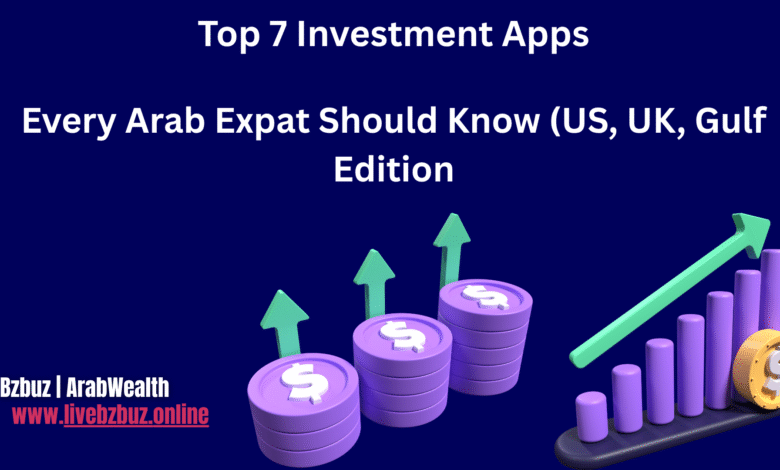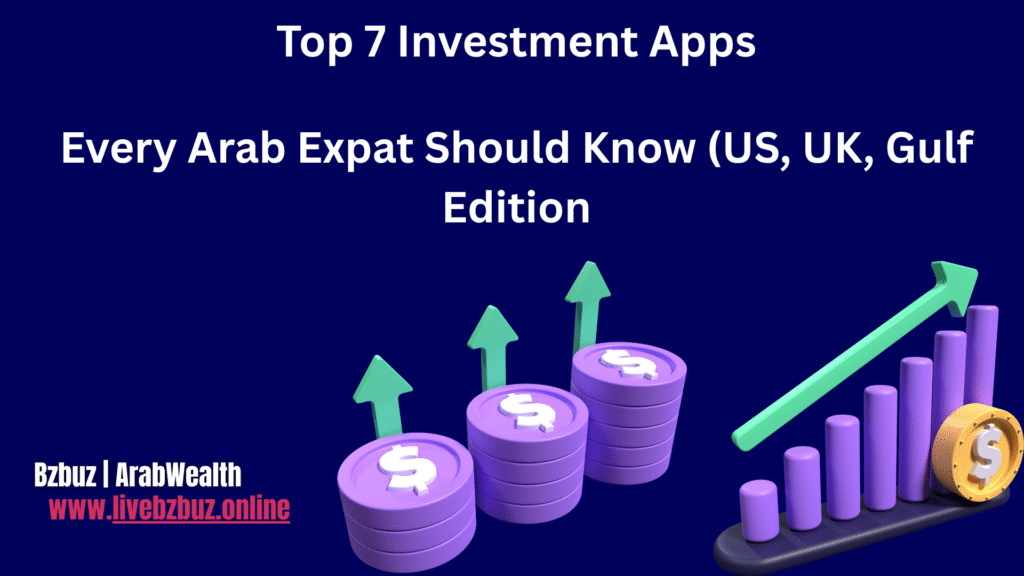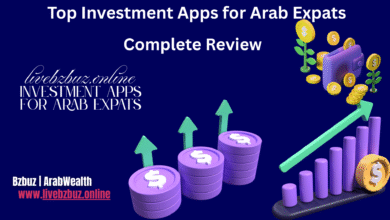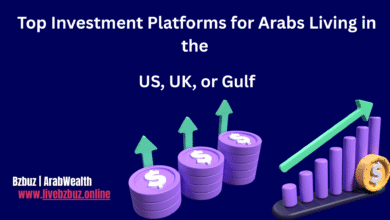Top 7 Investment Apps Every Arab Expat Should Know US, UK, Gulf Edition

Top 7 Investment Apps
Top 7 Investment Apps.Note: If the information below looks complicated, don’t worry – once it’s set up, it is fairly quick and painless. No technical skills required. Don’t let someone take a lifetime of fees from you – believe in yourself enough to set up a couple of accounts and learn some new concepts.

Being an Arab expat shouldn’t mean you’re locked out of smart investing. Yet most of us are wandering in the dark, getting pitched overpriced “investment plans” by smooth-talking salespeople in Dubai’s financial district, or worse – keeping our money in savings accounts earning 0.5% while inflation eats away at our purchasing power.Top 7 Investment Apps.
The truth is, with the right apps and a bit of knowledge, you can build wealth just as effectively as someone living in New York or London. Let’s say you invest $2,000 monthly for 25 years (a realistic amount for many expat professionals). With an 8% average annual return minus 1% in total costs, you’ll end up with $1,578,000. Nearly $1.6 million – not bad for someone who “can’t invest properly” as an expat!
But here’s the kicker: if you’re paying 3% in annual fees (which many expat-targeted funds charge), that same investment drops to $1,051,000. You just lost $527,000 to fees. Half a million dollars – gone.Top 7 Investment Apps.
No financial advisor wants you to know this
The financial services industry has convinced expats that investing is complicated and requires expensive professional management. They’ll sell you insurance-wrapped investment products, offshore funds with 5% annual fees, or pension plans you can’t access for decades. Meanwhile, the same diversified portfolio they’re offering you can be replicated for under 0.5% annual fees using the right apps.
Why Traditional Banks Fail Arab Expats
Before we dive into the solutions, let’s understand why your bank’s investment options are probably terrible:
Currency Exchange Rape: Your bank will charge you 2-4% on currency conversions. Invest $1,000 and lose $40 immediately – before you’ve even invested a penny.
Limited Options: Most regional banks offer maybe 10-20 funds, usually their own expensive products. Meanwhile, global platforms offer thousands of ETFs and stocks.
Geographic Restrictions: Try opening a Schwab account from Dubai – good luck. Most quality brokers won’t touch expats due to regulatory complexity.
Minimum Investments: Many require $50,000+ minimums for decent portfolio management services.
The 7 Apps That Actually Work for Arab Expats
1. Interactive Brokers (IBKR) – The Swiss Army Knife
Best for: Serious investors who want access to everything Minimum: $0 (though $2,000+ recommended) Countries: Available in UAE, Saudi Arabia, Kuwait, Bahrain, Qatar, and most countries
Interactive Brokers is the gold standard for expat investing. Yes, the interface looks like it was designed in 1999, but underneath that ugly exterior is the most powerful investing platform available to non-US residents.Top 7 Investment Apps.
Why it’s perfect for Arab expats:
- Accepts residents from Gulf countries
- Currency exchange at near-interbank rates (0.002% spread)
- Access to US, European, Asian markets
- Margin trading if you’re into that
- Excellent customer service (surprisingly)
The catch: The platform can be overwhelming. You’ll need to spend a weekend learning how to use it properly. But once you do, you’ll wonder why you ever considered anything else.
Real example: Ahmed from Dubai invests $3,000 monthly through IBKR into a mix of VTI (US total market), VXUS (international), and BND (bonds). His total annual costs: 0.1% expense ratios + ~$50 in trading fees = roughly 0.2% total. Compare that to his bank’s “international growth fund” charging 2.5% annually.
2. Saxo Bank – The European Alternative
Best for: Expats who prefer European regulation Minimum: $5,000 Countries: Licensed in UAE, available across Middle East
Saxo Bank bridges the gap between full-service wealth management and DIY investing. Their platform is more user-friendly than IBKR but still offers institutional-grade tools.
Why Arab expats love it:
- Regulated by multiple European authorities
- Excellent research and analysis tools
- Fractional shares available
- Professional-grade platform that doesn’t require a PhD
The downside: Higher fees than IBKR, especially for smaller accounts. But if you’re investing $5,000+ monthly, the difference becomes negligible.
3. Swissquote – The Stability Play
Best for: Conservative investors who want Swiss reliability Minimum: $1,000 Countries: Available in most Gulf countries
If you want to sleep well at night knowing your money is with a Swiss bank, Swissquote is your answer. They’re not the cheapest, but they’re rock-solid reliable.
Perfect for expats who:
- Prioritize security over rock-bottom fees
- Want access to Swiss franc investments
- Prefer traditional banking relationships
- Don’t mind paying a bit more for peace of mind
4. eToro – The Social Trading Platform
Best for: Beginners who want to learn by copying others Minimum: $200 Countries: Available in most Middle Eastern countries
eToro gets a bad rap from serious investors, but it’s actually brilliant for beginners. You can literally copy the portfolios of successful investors automatically.
Why it works for Arab expats:
- Social media-style interface (if you can use Instagram, you can use eToro)
- Copy successful traders automatically
- Zero commission stock trading
- Cryptocurrency options
The reality check: The “copy trading” feature is mostly marketing. The real value is the simple interface and zero-commission stock trading. Use it to learn, then graduate to something more sophisticated.
5. Charles Schwab International – The American Dream
Best for: Expats with US ties or planning to move to the US Minimum: $25,000 Countries: Limited availability in Middle East
Getting a Schwab International account as a Middle East resident is like getting a golden ticket. It’s difficult but not impossible, especially if you have US connections.
Why it’s worth the effort:
- Access to Schwab’s excellent ETF lineup
- No foreign transaction fees
- Excellent customer service
- Pathway to US investing if you relocate
The challenge: Schwab is picky about who they accept. You’ll need a compelling reason why you need a US-based account.
6. Revolut – The Fintech Darling
Best for: Casual investors who want everything in one app Minimum: $1 Countries: Available in UAE and expanding
Revolut isn’t primarily an investment app, but their investment features are surprisingly good for casual investing.
Perfect for:
- Monthly investing small amounts
- Currency exchange at great rates
- All-in-one financial management
- Commission-free stock trading
The limitation: Limited investment options compared to dedicated brokers. Great for getting started, but you’ll likely outgrow it.
7. StashAway – The Robo-Advisor
Best for: Hands-off investors who want professional management Minimum: $1,000 Countries: Available in UAE, Saudi Arabia, Kuwait
StashAway is a robo-advisor that creates and manages diversified portfolios automatically. Think of it as having a financial advisor without the hefty fees.
Why expats choose StashAway:
- Automatic rebalancing
- Tax-optimized for expats
- Transparent fee structure (0.8% annually)
- No minimum investment requirements
The Real Strategy: Multi-Platform Approach
Here’s what successful Arab expats actually do – they don’t put all their money in one app. They use a combination:
Primary Platform (70% of investments): Interactive Brokers or Saxo Bank for core holdings Secondary Platform (20%): Revolut or eToro for experimental investments Emergency Platform (10%): StashAway for completely hands-off investing
Example Portfolio for a Dubai-based Expat earning $8,000 monthly:
- $4,000 through IBKR: 60% VTI, 30% VXUS, 10% BND
- $1,000 through Revolut: Individual stocks and crypto
- $500 through StashAway: Conservative portfolio for emergency fund growth
The Hidden Costs Nobody Talks About
Currency Exchange: Even “free” platforms make money on currency conversion. IBKR charges 0.002%, while your bank might charge 2-4%. On a $50,000 investment, that’s $1,000 vs $20.
Withdrawal Fees: Some platforms charge $25+ for withdrawals. If you’re regularly moving money, this adds up quickly.
Inactivity Fees: Several brokers charge monthly fees if you don’t trade enough. Read the fine print.
Tax Implications: This is the big one. Depending on your residency status, you might owe taxes in multiple countries. Consider consulting a tax advisor who specializes in expat situations.
Setting Up Your First Account: The Step-by-Step Reality
Week 1: Choose your primary platform (I recommend starting with IBKR) Week 2: Gather documents (passport, visa, salary certificate, bank statements) Week 3: Complete application and wait for approval Week 4: Fund your account and make your first investment
Pro tip: Start with $5,000 if you have it. Smaller amounts often trigger higher fees or account restrictions.
The Mistakes That Cost Arab Expats Millions
Mistake #1: Waiting for the “perfect” time to start. The best time to plant a tree was 20 years ago. The second-best time is now.
Mistake #2: Putting everything in one investment. Diversification isn’t just a buzzword – it’s your insurance policy.
Mistake #3: Trying to time the market. You’re not smarter than the market. Nobody is.
Mistake #4: Paying for expensive “expat-focused” investment products. Most are just expensive mutual funds with marketing budgets.
Mistake #5: Not understanding the tax implications. Ignorance isn’t bliss when it comes to taxes.
The Bottom Line
You don’t need to be a finance expert to invest successfully as an Arab expat. You just need to avoid the traps, choose the right tools, and start. The difference between investing wisely and falling for expensive investment products isn’t just a few percentage points – it’s literally hundreds of thousands of dollars over your career.
The platforms listed above aren’t perfect, but they’re infinitely better than keeping your money in a savings account earning nothing, or worse, buying some overpriced insurance-investment hybrid product that enriches everyone except you.
Start with one platform. Learn how it works. Invest regularly. Keep your costs low. That’s it. The rest is just noise.
Remember: The best investment app is the one you’ll actually use consistently. Perfect is the enemy of good, and good is the enemy of started.
Disclaimer: This is not financial advice. Past performance doesn’t guarantee future results. All investments carry risk. Consider your personal situation and consult with a qualified financial advisor before making investment decisions.

